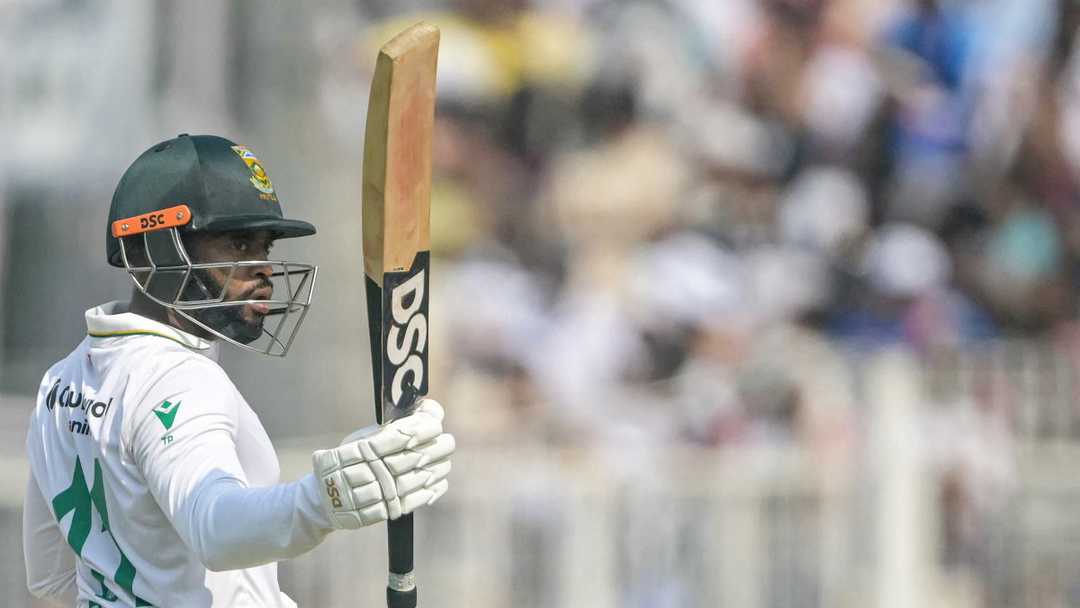
Harmer's hand grenades, battling Bavuma's brilliance earn wonder win
What on earth was Temba Bavuma thinking? Keshav Maharaj? To Axar Patel? No! Why?!
Simon Harmer had completed his 13th over bowling unpinned hand grenades. Aiden Markram had conceded a solitary single in the over before that, leaving India needing 47 to win.
The rangy, ambitious, hard-hitting Axar Patel was their best chance of doing that. South Africa's best chance was to keep turning the ball away from Patel's potentially punishing bat, not put it into his hitting arc.
Yet there Maharaj stood, ready to bowl to Axar despite having not made an impression in eight overs that went for 21. And despite India having gone 76 deliveries without finding the boundary.
Axar, who had faced eight for his nine, put that right when he hammered Maharaj's first offering towards midwicket – where Ryan Rickelton lost the ball in the sun and ran the wrong way, turning what might have been a catch into four runs.
Another slog sweep followed, launching the ball high over midwicket for six.
That sent a jolt of hope through the 39,769 holding their breath in Eden Gardens' vast and sweeping stands: "India! India! …"
Two balls. Ten runs. Thirty-seven seemed exponentially smaller than 47.
A chastened Maharaj, looking for something, anything, to change his looming reality, went over the wicket. Axar squirted the ball towards point, and might have taken a single. Jasprit Bumrah held up a halting hand – nahi, bhai; we'll get them in boundaries.
Sure enough, Axar bent his back leg and broadsworded Maharaj's next attempt into the seats beyond long-on to reduce the target to 31.
Maharaj then tossed it up slower and wider. Axar lunged into another slog sweep. But the pace and position of the ball undid his intention. Instead the ball went up and up and up, and then came down and down and down. And when it was around a metre-and-a-half above the ground, Bavuma caught it.
He had waited an age and moved several metres back from his position at midwicket, all the while keeping his eye locked on his rising and then descending prey. He knew the match hinged on him taking that catch. He knew South Africa wouldn't get a chance like this again. We all knew it was a difficult catch under any circumstances, nevermind in a moment as momentous and magical as this.
What else did Bavuma know? Specifically about why to bowl Maharaj there and then?
"With the right-hander, Kesh comes into the game," Bavuma told a press conference. "But with the lefties [Washington Sundar, Patel, and Kuldeep Yadav] batting, we tried to go with Aiden and Simon for as long as they could or at least get a wicket. Once the right-hander [Bumrah] was exposed, I felt that Keshav was the attacking option.
"Axar had made clear his intentions for what he was going to do in that over. He got a couple through, but he did give us a chance with Rickleton. Ryan wasn't too happy about that, but this is a ground where something like that does happen with the stands and the spectators being quite low.
"But you try to keep to your wits about you. The decision stays the decision. It doesn't change because of the way the guy is batting. There was sense behind the decision, so at no point did I second-guess it."
Maharaj switched back to round the wicket to the incoming Mohammed Siraj, who pushed forward gingerly and edged to slip – where Markram smartly held a low catch.
Cue a riot. Not in the stands at a ground that has seen a fair few of them, but on the field. The South Africans let it all out; the joy, the satisfaction, emotion, the passion, the stress, the relief.
They had won a Test in India for the first time in nine attempts and in almost 16 years. They had won on a pitch that defied any batting approach. They had won without Kagiso Rabada, who showed no sign of the rib problem that kept him out of the match when he stormed onto the ground to join the celebration.
At least Rabada could do that. India had lost without their captain, Shubman Gill, who injured his neck while batting in the first innings and was stretchered into an ambulance and to hospital.
India's original target, 124, was the second-lowest they had failed to reach. It was also the second-lowest South Africa had defended against any opponents. And the second-lowest successfully defended by any opponents in Tests in India. But there was nothing second-prize about it.
Not since Hansie Cronje – in the absence of the injured Kepler Wessels – engineered a raid of six wickets for 54 runs on the last day in Sydney in January 1994 had South Africa defended fewer runs. Set 117, Australia crashed for 111 with Fanie de Villiers taking 6/43 in the innings to complete a match haul of 10/123.
But that was in conditions the South Africans understood. And after they had scored 10 more runs in the first innings than the 159 they were bowled out for in Kolkata. They conceded a lead of 123 at the SCG, which only adds to their achievement of curbing India's advantage to 30.
They won at the SCG not least because the fidgety, scratchy, limited Jonty Rhodes held it together well enough in the second innings to bat for more than three hours, face 162 balls and score an unbeaten 76.
South Africa won at Eden Gardens largely because of Harmer's elevation of the off-spinner's art for his figures of 4/30 and 4/21 in a total of 29.2 overs. It was a happy return to India for Harmer, whose only other series here, the 3-0 drubbing South Africa suffered in November 2015, precipitated his absence from international cricket for almost seven years.
"I've been here before and it was a dark place," Harmer told a television interviewer. "To get here, to be in this position, to be behind the eight-ball again, and for the team to fight the way that they did, it shows where this group is at; what they're capable of and the belief that they have." Told he now owned the best match figures by a South Africa spinner in India, he said: "I'm not a stats man. I'm a win man; I'm happy with the win."
That brings us back to Bavuma. South Africa wouldn't have won without their captain's batting in the second innings.
At stumps on Saturday, Bavuma was 29 with his Proteas wilting with a lead of only 63 and just three wickets standing. He was in his sixth partnership of the innings and would bat through two more for his three-hour, 136-ball 55 not out.
It was the only score of the match of more than 39, a consequence of a surface of chronically inconsistent bounce. It was also easily the most patient and disciplined innings of the game.
Fittingly, Bavuma reached his half-century with an inside edge off Bumrah that streaked past his leg stump and to the fine leg boundary. That captured the essence of his innings – it wasn't perfect and it wasn't pretty, but it wasn't short of guts, application and focus.
Four overs later Bumrah successfully appealed for Bavuma's wicket leg-before. Bavuma referred, and then stood calmly practising his forward defence until the verdict was returned: missing leg, not out. That's what grace under fire looks like.
And at Eden Gardens of all places. It was there that South Africa played in their inaugural ODI and their inaugural game against India in November 1991 to come back in from the cold of isolation. It was there that they won, by 329 runs in November 1996, a Test in India for the first time. It was there, in November 2023, that they gifted Virat Kohli a birthday century and the Indians a World Cup victory by 243 runs. It was there, still in November 2023, that Bavuma came through a fitness test that was obsessively watched by the travelling South African press to be cleared to play in the semifinal of that tournament. It was there, in that semi, that Australia beat them by three wickets.
And now this, a triumph for the ages, a "where were you when" win, victory when they seemed certain to be vanquished. Along with the continuation of a curious symmetry: if South Africa are at Eden Gardens in November, look out. Big things will happen.

